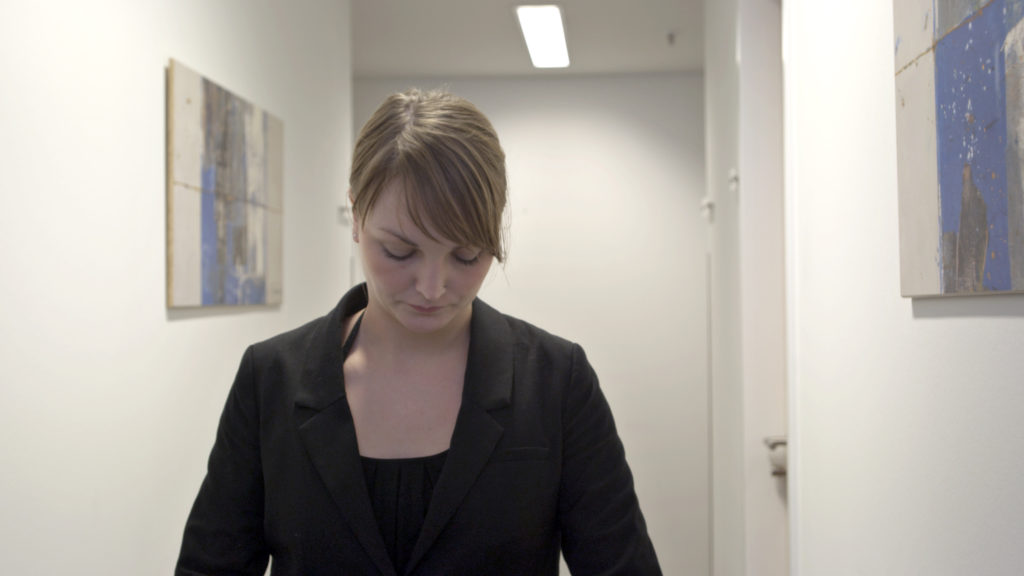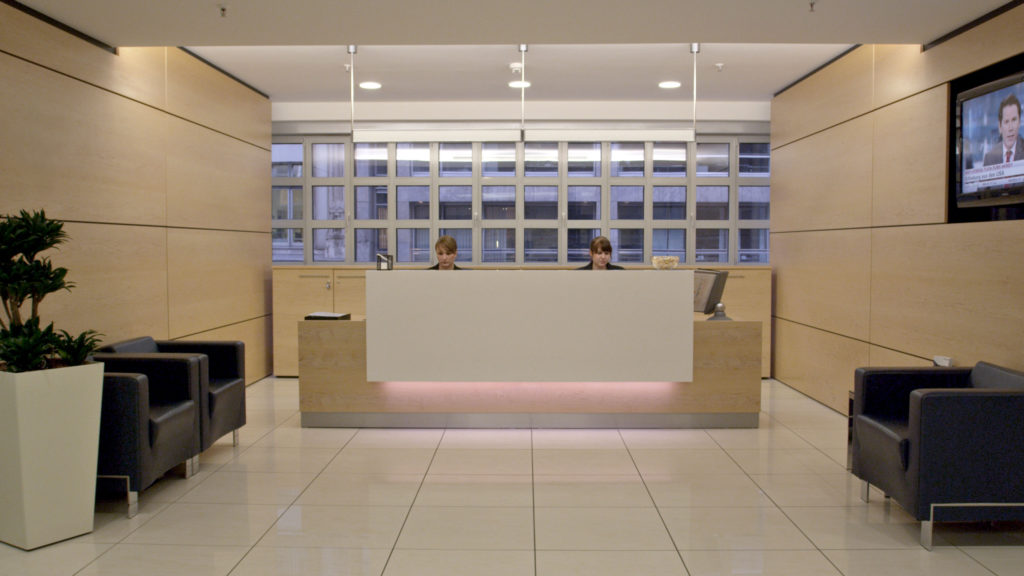take for granted
excerpt: 1:29 min
8:19 min | 4K | mono | 2013
director | editor | producer: Mandy Krebs
camera: Felix Pötzsch
sound: Marko Schiefelbein
cast: Lina Barten, Maxi Schölzel
In static shots Mandy Krebs investigated structures and details of an office complex and follows with a camera the activities of two women in black business dresses. In the kitchen, the hall, the office space, the conference rooms and the business lounge, they fulfill their responsibilities silent and with routine. Their speechlessness at the copy machine, while supplying coffee cups and working the computer at the reception desk clearly exposes the presence of the silence that is ruling the office.
The perspective of the camera in the individual rooms displays a functional furnishing, which acts strangely inanimate and unused. LAN-cable lying on the desks, which lack computers and do not present any personal belongings otherwise. In heavy contrast to the barren offices are the representative rooms of the Business Lounge, with their diffuse lighting and dark leather chairs, the reception desk with flat screen TV and designed entrance, designed with marble, where at the end of take for granted one of the two women steps expectantly in front of the closed elevator doors.
The artist shows fragments of a seemingly neutral office life, but the observation gradually raises doubt. Where are those who work here? Is this in fact an office like any other? The image remains verbally uncommented. In earlier video works, Mandy Krebs also uses the uncertainty about the status of the presented reality to refer to central question of her artistic work: In what way does architecture define (social) space and exercise power over bodies, capital and representation?
In fact take for granted takes place in a rental office as they can nowadays be found in every European metropolis. Architecture here serves an idea which is closely linked to the idea of globalization and individualized labor. The efficiency of spatial structures is justified by today‘s ways of working: Flexible facilities that appeal to flexible customers, who operate by means of laptop and smartphone and who from time to time would like to draw from the advantages of an external workspace, a conference room or the support of reception staff. The temporarily usable office space not only serve start-up entrepreneurs and other self-employed as interim fixed point, also freelancers of the cultural and creative sectors make use of this possibility more and more.
The number of offices for rent and coworking spaces in Germany has increased considerably in recent years, where the British group REGUS is one of the market leaders in the field. Their idea of “professional work atmosphere” is being tested as a pilot project in Berlin since 2013 at gas stations: In the back rooms of Shell stations small office chambers are offering the traveling customers a place for concentrated work. A kind of drive-in for the flexible worker of the 21st Century.
Providers such as REGUS seem to provide their services to a status quo, which leads to a general acceptance of boundless and highly flexible labor as a phenomenon of our time. In take for granted Mandy Krebs questions which role is it, the service providers themselves play within this process: Who and what is taken for granted and what kind of consequences does this development bring along?
/ / Jasmin Meinold, transl. S.Fueldner
2016
.perf au Printemps Carougeois, Halles de la Fonderie, Carouge, Geneva, Switzerland
Letters from Pocket Embassy VI (Geneva Edition), Maison Baron, Geneva, Switzerland
2015
Letters from Pocket Embassy V (Berlin Edition), Montagehalle Wedding, Berlin, Germany
2014
Festival Miden – Total zero!, Kalamata, Greece
Take For Granted, Kunstraum Düsseldorf, Germany
Freispiel, Galerie vom Zufall und vom Glück, Hanover, Germany
2013
SIMULTAN Festival, Timisoara, Romania

